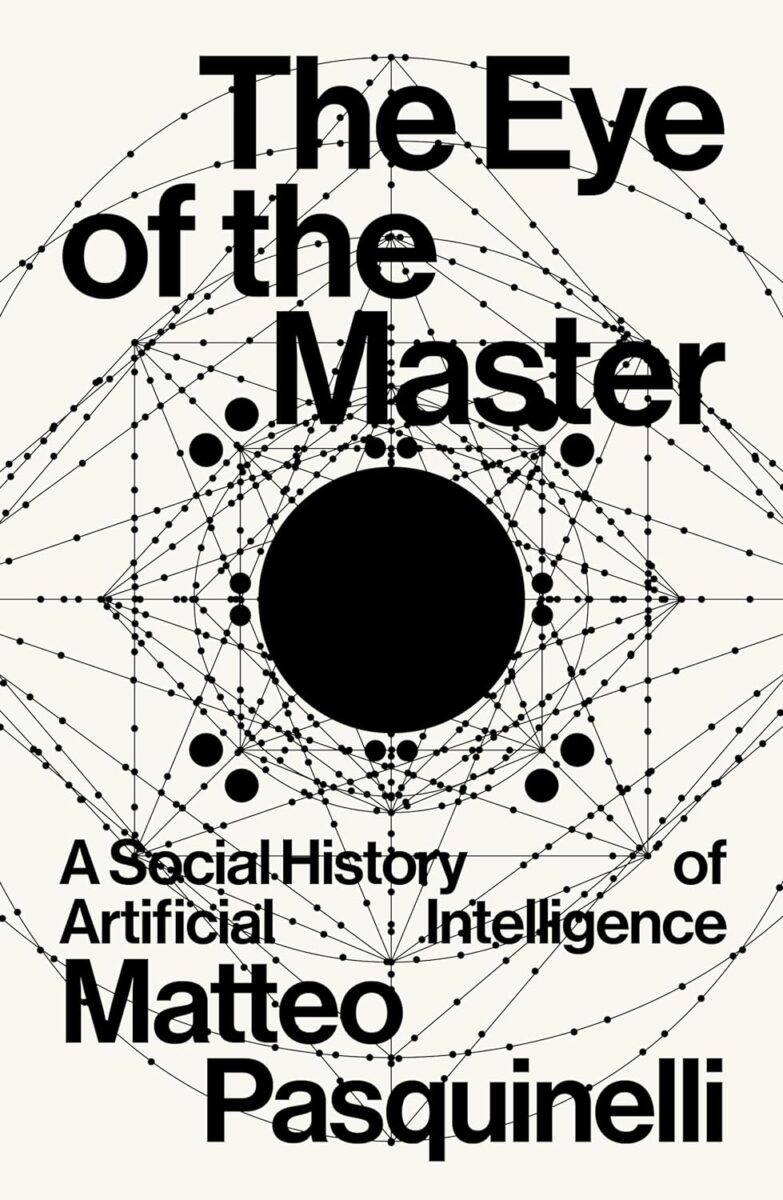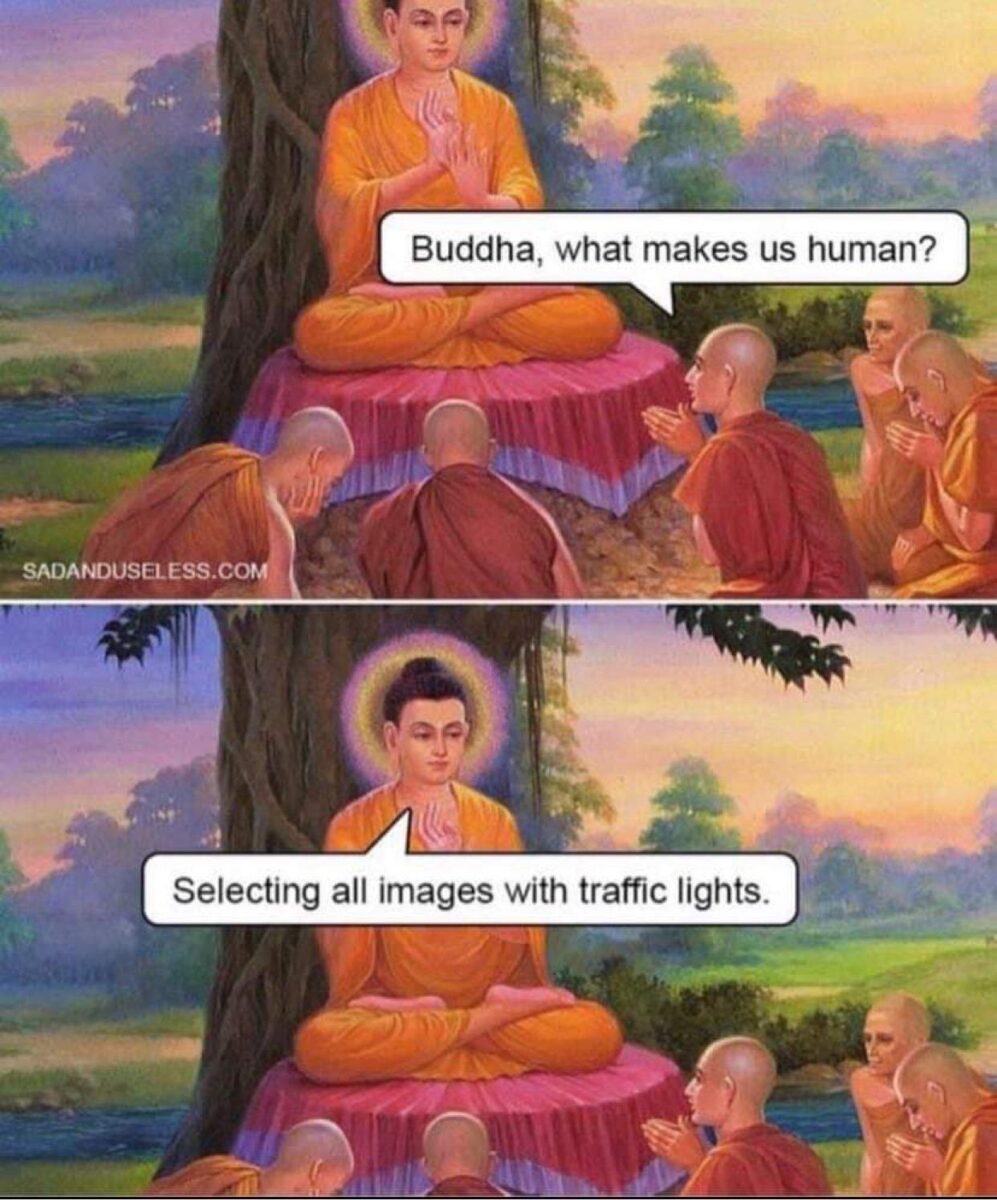Before we panic about the impact of AI we need to step back and look at where it has come from, what social function it serves, and how it is meshed, and meshes us, into late capitalism. The detailed history and conceptual-political analysis in this new book, The Eye of the Master: A Social History of Artificial Intelligence by Matteo Pasquinelli (Verso, 2023) does that well. It is an indispensable starting point for thinking through how we use AI, including ChatGPT, instead of allowing it to use us.
There is a wealth of analysis in this book, and a history that ranges from early computer development, in which women’s labour is rendered invisible, to the role of simple “pattern recognition” that underpins most of what we mistakenly describe as “intelligent” in contemporary AI, and the ideological use of research into “neural networks” that actually projects present-day social relations into descriptions of how they seem to operate. It raises a number of crucial questions about how we think about the role of technology in general.
Technology, creativity and change
The Eye of the Master is named for the forms of surveillance and regulation that are necessary for capitalism to develop, with “the master” being the system of control that Marx described – “the power of the ‘master’” he refers to in Capital – rather than a particular individual master who is observing things and pulling the strings behind the scenes. The “eye” of the master is the increasing monitoring of each aspect of the labour process (and of consumer choice patterns), a process that includes, of course, the incitement of each subject to willingly offer themselves up to the gaze of the master.

This, the book argues, is basically what AI is; it is not a supernaturally “intelligent” phenomenon, but something much more banal than that, an entirely “artificial” invention that embeds certain kinds of exploitative and oppressive social relations in society and in the way we think about ourselves. AI is the “eye of the master” as it accumulates the rotten ideological “commonsense” of a society and implements it as if it were the only truth, indeed as if there was no alternative. Pasquinelli puts it this way: “the inner code of AI is constituted not by the imitation of biological intelligence but by the intelligence of labour and social relations”.
The book gives us a history of technology under capitalism, one that emphasises, time and again, the ingenuity and creativity of human beings and the way that ingenuity and creativity is betrayed, absorbed and neutralised, “recuperated,” put in the service of capital accumulation. It is working from within a certain kind of Marxism that takes human creativity as the fundamental founding principle of analysis; “human praxis expresses its own logic (an anti-logic, some might say) – a power of speculation and invention, before technoscience captures and alienates it”.
This is a rather different starting point from the classical Marxist approach that is often taken for granted by many of us on the left, and so we are drawn into a conceptual debate that is important for us to think through in the way we think about history and possibilities of change. So, one traditional way of working with Marxist analysis is to insist that historical developmental technological processes create, give rise to, certain kinds of social relations, including the progressive possible social relations that are the basis for socialist struggle. In this traditional Marxist way of thinking about things, the “working class” is created by capitalism, and then becomes a collective agent to overthrow it; capitalism creates its own gravedigger.
This book is coming from an alternative reading of Marx, one that is linked to Italian Autonomist Marxism, in which workers’ creativity comes first, and capitalism leeches on that, distorting it. Revolution, in this way of thinking, is a reclaiming of collective potential that was always already there. So, the book argues for an analysis of how that creativity is stolen, mechanised, turned against us; Pasquinelli writes about “collective knowledge and labour as the primary source of the very ‘intelligence’ that AI comes to extract, encode, and commodify”. Maybe he is right; the book makes a convincing argument for this interpretation of Marxism. In this way Pasquinelli argues for what he calls a “labour theory of machine intelligence,” that is, one which shows us that labour is ineliminable, and it is only the organisation of labour that gives us a way out.
Knowledge and control
Is this form of knowledge we are subjected to now really a kind of “master?” Yes, in the sense that Marx spoke of the machinery of domination that we are confronted with as workers under capitalism, and this machinery of domination presents itself to us as if it is “open” and transparent. Go to the ChatGPT portal, for instance, and it will tell you that this is a place of “open AI” (while also inviting you to write something about kittens, one of a number of useful tasks you didn’t know you needed to do). What is hidden in plain sight here is that this “master” is distributed, a network of forms of control, and one in which we are made to watch each other and watch over ourselves.
Pasquinelli draws on a range of theoretical resources to make his argument, and they include classical Marxism, Italian Autonomist Marxism, the work of the historian Michel Foucault (who wrote a lot about forms of surveillance and power in modern society) and the work of Foucault’s buddy Gilles Deleuze. It was Deleuze who wrote a Postscript on the Societies of Control, a brief dense text which, Pasquinelli reminds us, “declared that power was no longer concerned with the discipline of individuals but with the control of dividuals, that is of the fragments of an extended and deconstructed body.” These “dividuals” are objectified versions of ourselves, less even than the “individuals” we are told we should be in liberal capitalism. We are broken up, made less than human, and this “society of control” is the basis of the “platform capitalism” that current versions of AI thrive in.
Work and workers
One scary, but, if you think about it, predictable use of AI, is to watch over employees and regulate their work (and we need to watch those who are watching us). Pasquinelli takes that argument further, pointing out that the old and still much-rehearsed hopes (and fears) of AI go back to the earliest experiments with “machine intelligence” and its precursors back in the nineteenth century. According to this story, workers will be unnecessary, and a professional class of thoughtful experts will guide the technology. This has proven to be quite false. It is false on two counts.
First, this “new technology” does not at all dispense with workers, but requires them, requires more and more of them to work more intensively and for longer hours to service the machinery that enables AI to function. As Pasquinelli argues, “platform capitalism is a form of automation that in reality does not replace workers but multiplies and governs them anew”. The servers, and the many other materially-existing technological devices that are needed to keep the AI apparatus running, are served by a new labour army of mostly invisible workers; there is now an “army of ‘ghost workers’ from the Global South.”
These low-paid precarious women and migrant workers and those in out-sourced locations feed the illusion that “the cloud” is immaterial, as if it is a magical mysterious place where the data floats around, thus complementing the illusion that online banking and investment practice is, in a weird inexplicable way growing profit, rather than managing and harvesting living labour. At this point the analysis cries out for an account of social reproduction, the social reproduction of work and workers that learns lessons from analyses of domestic labour.
Second, the flipside of this failed hope, a false promise, is that AI is actually, instead, replacing what was once dubbed (by one ex-Trotskyist, James Burnham, it so happens) the managerial class who are being eaten alive by their own supposed revolution. Thus, there is not an automation of work, but work that needs to be performed under conditions of intensified surveillance and able to fit into the needs of the automated technology, and so, Pasquinelli argues, there is “automation of management” and “algorithms replace management and multiply precarious jobs”.
Unintelligent conclusions
The Official Monster Raving Loony Party candidate in the Rochdale by-election (one of the least worst candidates to stand there) had as one of his manifesto promises to change “AI” to “IA” (less ambitious than the party’s candidate in Wellingborough who wanted to abolish gravity).
We cannot wish these technological developments away, and need, instead, to tackle how the social relations they replicate and reinforce themselves need to be transformed so we will be able to turn technology from being an instrument of control to a means for our liberation. This very useful book holds open the hope of taking control of the machinery that is used to control us, with examples of self-organisation from within the Italian Autonomist tradition; as Pasquinelli argues toward the end of the book, “a collective ‘counter-intelligence’, has to be learned”.

Here is a twist on the story, something that should inspire hope and confidence in our ability to put this technology to good use. Pasquinelli reminds us that “the most zealous development of automation has shown how much ‘intelligence’ is expressed by activities and jobs that are usually deemed manual and unskilled,” so we are not the dolts we are made out to be when we fail to function as simple pattern recognition systems.
When we click on the image boxes to get into a website, selecting the bits of the picture that contains traffic lights say, to prove that we are “human”, it turns out that the “proof” is not so much that we tick the right boxes but rather that our wobbly faltering movement of the cursor is the giveaway; fully competent AI pattern recognition software would do it swiftly and smoothly. All to the good, there are some things that need to be done in that way.
One take-home message of this book is that development is not driven by technology, and that message is already there in Marx, but the driver of development, the “forces of production” are already underpinned, made possible, by certain “relations of production’ that are then crystallised in the technology. AI crystallises peculiar relations of power, and makes it seem like there is really a master with an eye on us. All this means that the alternative is, as ever in revolutionary anti-capitalist politics, self-conscious collective activity that goes way beyond the limited pattern-recognition formulae of AI, confronting the way it is currently used.
Art (53) Book Review (121) Books (114) Capitalism (68) China (80) Climate Emergency (98) Conservative Government (90) Conservative Party (45) COVID-19 (44) EcoSocialism (55) Elections (83) Europe (46) Fascism (57) Film (49) Film Review (68) France (70) Gaza (60) Imperialism (100) Israel (124) Italy (46) Keir Starmer (52) Labour Party (111) Long Read (42) Marxism (49) Marxist Theory (48) Palestine (169) pandemic (78) Protest (152) Russia (340) Solidarity (142) Statement (48) Trade Unionism (141) Ukraine (346) United States of America (132) War (368)


I have found enough hope in this article and what’s more, the well-thought argumentation of it makes the optimism of it trustworthy.
About our scepticism for AI the first thing we need to do is get the answer to what it actually is. Can it be really autonomous, i.e. self-conscious? Kindly inviting you to see if a serious answer is given; to my recent Facebook post, with reference to publication on the Foundations of Mathematics (2015).
https://www.facebook.com/manolis.xagorarakis